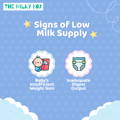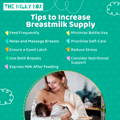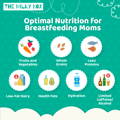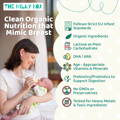1. Palacios, A. M. et al. (2023) ‘Effectiveness of lactation cookies on human milk production rates: a randomized controlled trial’, The American Journal of Clinical Nutrition, 117(5), pp. 1035–1042. doi: 10.1016/J.AJCNUT.2023.03.010.
2. Ryan, R. A. et al. (2023) ‘Use of Galactagogues to Increase Milk Production Among Breastfeeding Mothers in the United States: A Descriptive Study’, Journal of the Academy of Nutrition and Dietetics, 123(9), pp. 1329–1339. doi: 10.1016/J.JAND.2023.05.019.
3. Nice, F. J. (2011) ‘Common Herbs and Foods Used as Galactogogues’, ICAN: Infant, Child, & Adolescent Nutrition, 3(3), pp. 129–132. doi: 10.1177/1941406411406118.
4. Bazzano, A. N. et al. (2016) ‘A Review of Herbal and Pharmaceutical Galactagogues for Breast-Feeding’, The Ochsner Journal, 16(4), p. 511.
5. Kent, J. C., Prime, D. K. and Garbin, C. P. (2012) ‘Principles for maintaining or increasing breast milk production’, Journal of obstetric, gynecologic, and neonatal nursing : JOGNN, 41(1), pp. 114–121. doi: 10.1111/J.1552-6909.2011.01313.X.
6. Grzeskowiak, L. E. (2021) ‘No evidence that fenugreek is more effective than placebo as a galactagogue’, Phytotherapy Research, 35(4), pp. 1686–1687. doi: 10.1002/PTR.6914.
7. ‘Fenugreek’ (2023) Drugs and Lactation Database (LactMed). Available at: https://www.ncbi.nlm.nih.gov/books/NBK501779/
8. Breastfeeding Challenges | ACOG. Available at: https://www.acog.org/clinical/clinical-guidance/committee-opinion/articles/2021/02/breastfeeding-challenges
9. Can Certain Foods Increase Milk Supply? Available at: https://health.clevelandclinic.org/foods-to-increase-milk-supply
10. Exclusive breastfeeding for optimal growth, development and health of infants. Available at: https://www.who.int/tools/elena/interventions/exclusive-breastfeeding








